
Journal Menu
► ▼ Journal Menu-
- Brain Sciences Home
- Aims & Scope
- Editorial Board
- Reviewer Board
- Topical Advisory Panel
- Instructions for Authors
- Special Issues
- Topics
- Sections & Collections
- Article Processing Charge
- Indexing & Archiving
- Editor’s Choice Articles
- Most Cited & Viewed
- Journal Statistics
- Journal History
- Journal Awards
- Society Collaborations
- Conferences
- Editorial Office
Journal Browser
► ▼ Journal BrowserNeed Help?
Announcements
31 May 2024
Meet Us at the FENS Forum 2024, 25–29 June 2024, Vienna, Austria
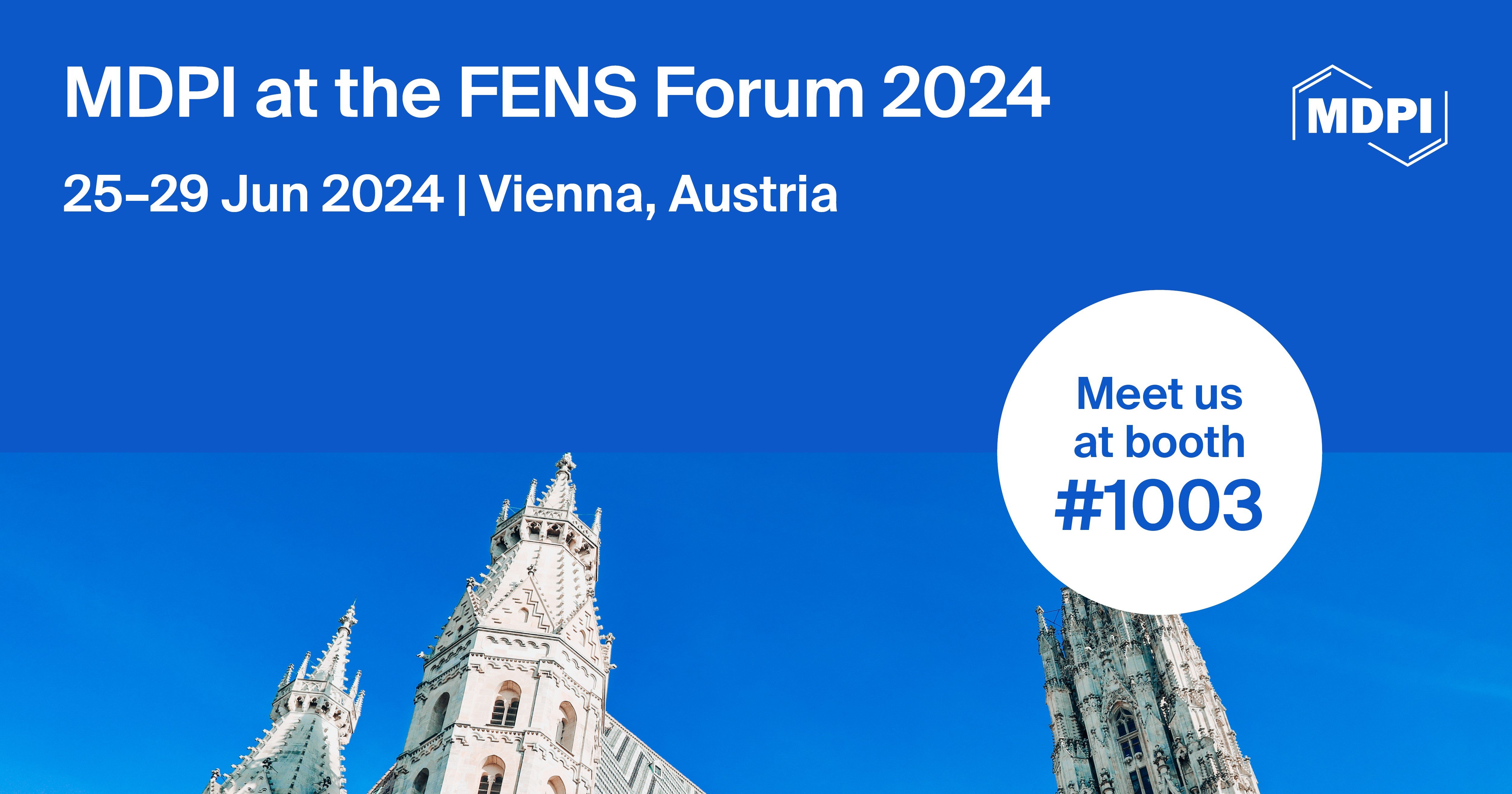
Conference: FENS Forum 2024
Date: 25–29 June 2024
Location: Vienna, Austria
MDPI will be attending FENS Forum 2024 as an exhibitor; we welcome researchers from different backgrounds to visit and share their latest ideas with us.
This conference has been organized by the Federation of European Neuroscience Societies (FENS), the Austrian Neuroscience Association (ANA) and and the Hungarian Neuroscience Society. The FENS Forum is Europe’s largest neuroscience congress, covering all areas of neuroscience from basic to translational research.
The following MDPI journals will be represented:
- Brain Sciences;
- Journal of Clinical Medicine (JCM);
- Cells;
- NeuroSci;
- Neuroglia;
- Biomedicines;
- Neurology International;
- Behavioral Sciences;
- Psychoactives.
If you are planning on attending this conference, please do not hesitate to contact us. Our delegates look forward to meeting you in person at booth #1003, and answering any questions that you may have. For more information about the conference, please visit the following website: https://www.fens.org/meetings/fens-forum/upcoming-fens-forums.
23 May 2024
Transfer Service in MDPI
We are pleased to announce MDPI’s Transfer Service.
This service provides a convenient method of transferring your manuscript file, along with any reviewer comments, to another journal within our publishing portfolio.
We are committed to helping authors find the right home for their research, and we will provide authors with guidance and technical support through all stages of the transfer process. Authors will be able to choose to transfer in the following two situations:
1. Select alternative journals on submission.
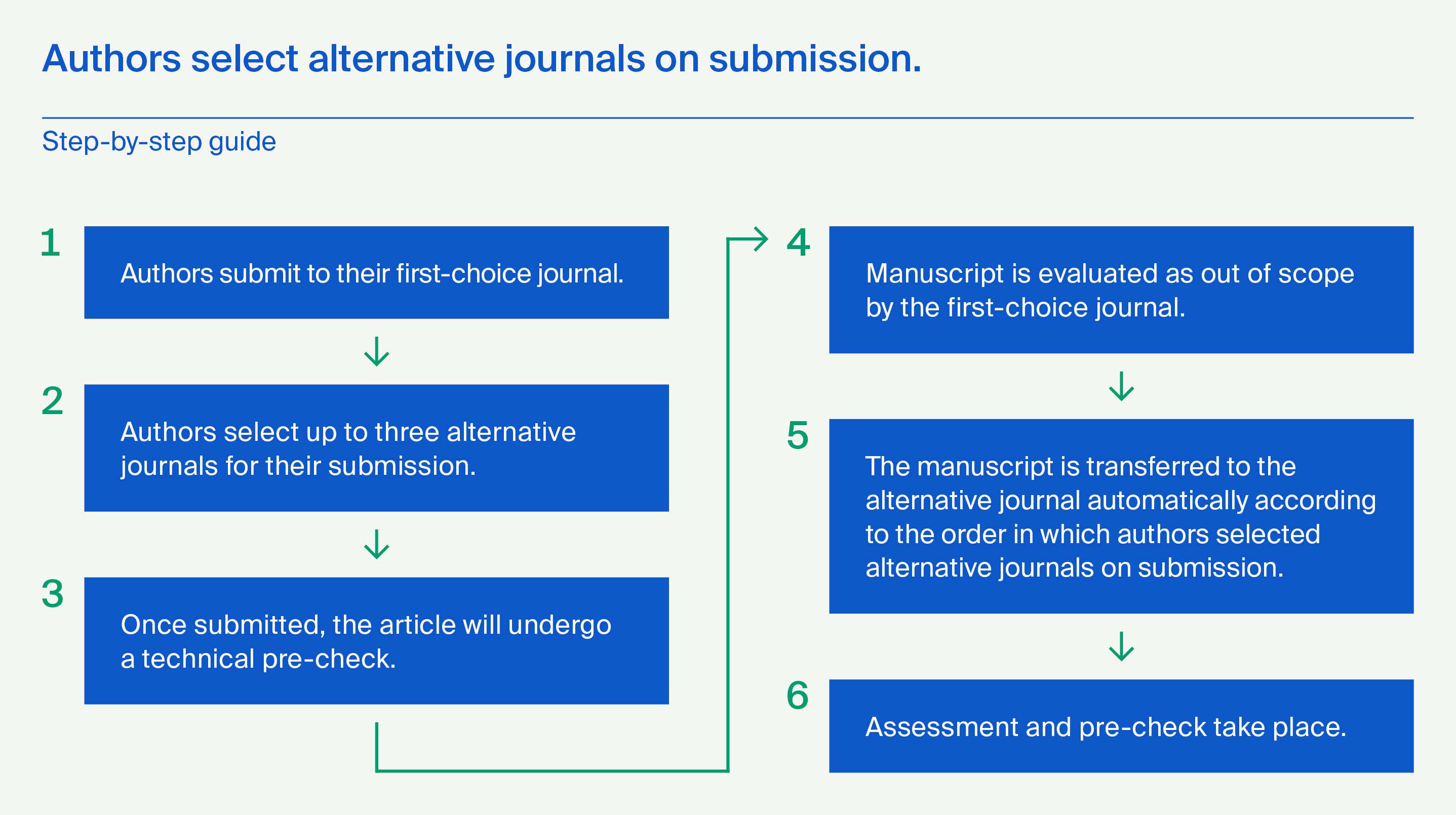
2. Authors are encouraged to transfer manuscripts to other MDPI journals.
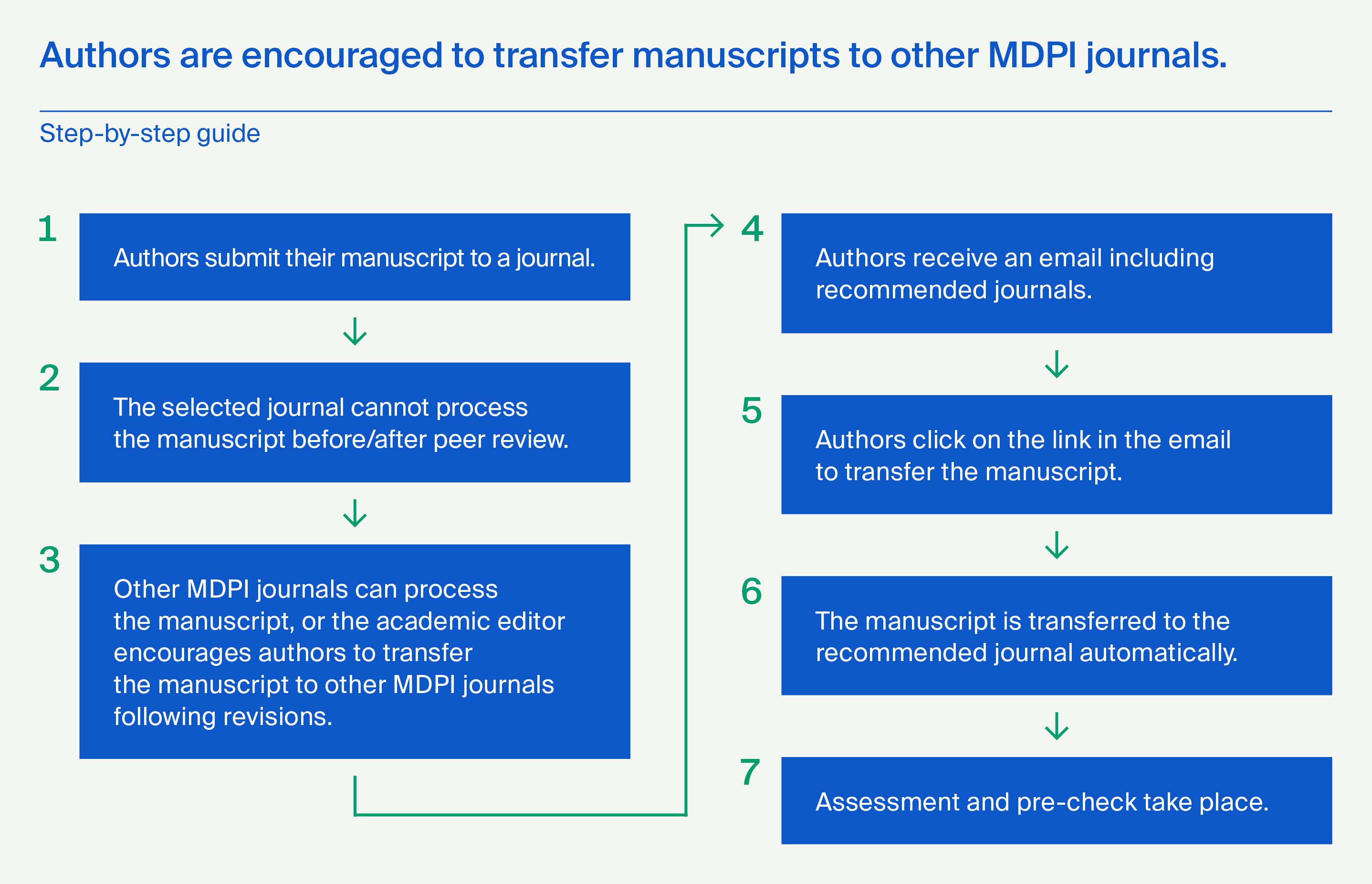
More details about the Transfer Service can be found at the following link:
20 May 2024
Brain Sciences | Highly Cited Papers in 2022 and 2023 in the “Neurotechnology and Neuroimaging” Section
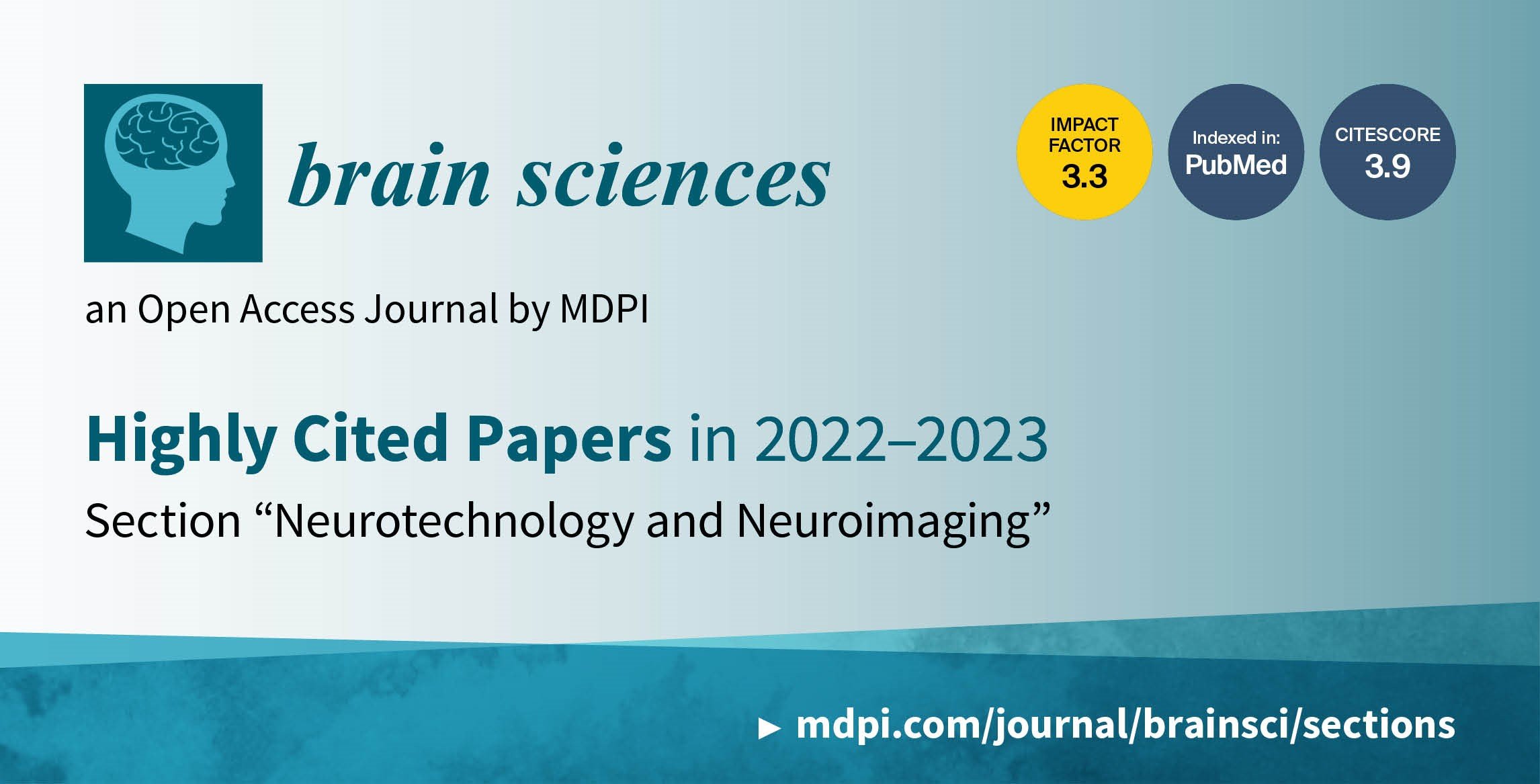
The mission of the “Neurotechnology and Neuroimaging” Section is to publish original observations and critical reviews on conventional and advanced bio-imaging, functional MRI, OCT, and PET, and other novel, technology-based diagnostic and therapeutic approaches. In recent years, neurotechnology has emerged as a fast-developing, exciting, and promising new field with the potential to change our existing approach to the diagnosis and treatment of neurological disorders. Our scope is to understand neuronal biology, degeneration, regeneration, and organization of neural circuits in disabling neurological diseases. Manuscripts on neuroplasticity, synaptic connectivity, in vivo imaging and imaging biomarkers, optogenetics, and different forms of neuromodulation are particularly welcome.
As all of the articles published in our journal are of an open access format, you have free and unlimited access to the full texts. We welcome you to read our most highly cited papers published in 2022 and 2023, listed below.
1. “Seeking Overlapping Neuroanatomical Alterations between Dyslexia and Attention-Deficit/Hyperactivity Disorder: A Meta-Analytic Replication Study”
by Donato Liloia, Annachiara Crocetta, Franco Cauda, Sergio Duca, Tommaso Costa and Jordi Manuello
Brain Sci. 2022, 12(10), 1367; https://doi.org/10.3390/brainsci12101367
Available online: https://www.mdpi.com/2076-3425/12/10/1367
2. “Safety of Clinical Ultrasound Neuromodulation”
by Sonja Radjenovic, Gregor Dörl, Martin Gaal and Roland Beisteiner
Brain Sci. 2022, 12(10), 1277; https://doi.org/10.3390/brainsci12101277
Available online: https://www.mdpi.com/2076-3425/12/10/1277
3. “Brain Asymmetry and Its Effects on Gait Strategies in Hemiplegic Patients: New Rehabilitative Conceptions”
by Luca Vismara, Veronica Cimolin, Francesca Buffone, Matteo Bigoni, Daniela Clerici, Serena Cerfoglio, Manuela Galli and Alessandro Mauro
Brain Sci. 2022, 12(6), 798; https://doi.org/10.3390/brainsci12060798
Available online: https://www.mdpi.com/2076-3425/12/6/798
4. “Intraoperative Cerebral Hemodynamic Monitoring during Carotid Endarterectomy via Diffuse Correlation Spectroscopy and Near-Infrared Spectroscopy”
by Kutlu Kaya, Alexander I. Zavriyev, Felipe Orihuela-Espina, Mirela V. Simon, Glenn M. LaMuraglia, Eric T. Pierce, Maria Angela Franceschini and John Sunwoo
Brain Sci. 2022, 12(8), 1025; https://doi.org/10.3390/brainsci12081025
Available online: https://www.mdpi.com/2076-3425/12/8/1025
5. “Evaluation of MTT Heterogeneity of Perfusion CT Imaging in the Early Brain Injury Phase: An Insight into aSAH Pathopysiology”
by Björn B. Hofmann, Igor Fischer, Daniel M. Donaldson, Yousef Abusabha, Cihat Karadag, Sajjad Muhammad, Kerim Beseoglu, Daniel Hänggi, Bernd Turowski, Christian Rubbert et al.
Brain Sci. 2023, 13(5), 824; https://doi.org/10.3390/brainsci13050824
Available online: https://www.mdpi.com/2076-3425/13/5/824
6. “Graph-Based Analysis of Brain Connectivity in Multiple Sclerosis Using Functional MRI: A Systematic Review”
by Sara Hejazi, Waldemar Karwowski, Farzad V. Farahani, Tadeusz Marek and P. A. Hancock
Brain Sci. 2023, 13(2), 246; https://doi.org/10.3390/brainsci13020246
Available online: https://www.mdpi.com/2076-3425/13/2/246
7. “Effects on Corticospinal Tract Homology of Faremus Personalized Neuromodulation Relieving Fatigue in Multiple Sclerosis: A Proof-of-Concept Study”
by Massimo Bertoli, Angela Tataranni, Susanna Porziani, Patrizio Pasqualetti, Eugenia Gianni, Joy Grifoni, Teresa L’Abbate, Karolina Armonaite, Livio Conti, Andrea Cancelli et al.
Brain Sci. 2023, 13(4), 574; https://doi.org/10.3390/brainsci13040574
Available online: https://www.mdpi.com/2076-3425/13/4/574
8. “Effective Intracerebral Connectivity in Acute Stroke: A TMS–EEG Study”
by Franca Tecchio, Federica Giambattistelli, Camillo Porcaro, Carlo Cottone, Tuomas P. Mutanen, Vittorio Pizzella, Laura Marzetti, Risto J. Ilmoniemi, Fabrizio Vernieri and Paolo Maria Rossini
Brain Sci. 2023, 13(2), 233; https://doi.org/10.3390/brainsci13020233
Available online: https://www.mdpi.com/2076-3425/13/2/233
9. “Upper Limb Function Recovery by Combined Repetitive Transcranial Magnetic Stimulation and Occupational Therapy in Patients with Chronic Stroke According to Paralysis Severity”
by Daigo Sakamoto, Toyohiro Hamaguchi, Kai Murata, Hiroshi Ito, Yasuhide Nakayama and Masahiro Abo
Brain Sci. 2023, 13(2), 284; https://doi.org/10.3390/brainsci13020284
Available online: https://www.mdpi.com/2076-3425/13/2/284
10. “Modulation Effects of Repeated Transcranial Direct Current Stimulation at the Dorsolateral Prefrontal Cortex: A Pulsed Continuous Arterial Spin Labeling Study”
by Valeria Sacca, Nasim Maleki, Ya Wen, Ya Wen, Sierra Hodges and Jian Kong
Brain Sci. 2023, 13(3), 395; https://doi.org/10.3390/brainsci13030395
Available online: https://www.mdpi.com/2076-3425/13/3/395
20 May 2024
Brain Sciences | Interview with Asst. Prof. Dr. Francisco A. Nieto Escámez, the Committee Member of the 4th International Electronic Conference on Brain Sciences
1. Could you introduce your current research direction and provide an update on your progress?
Currently, my research focuses on two main areas: the use of Virtual Reality for neurorehabilitation in individuals with mild cognitive impairment and dementia, and the design of residential spaces that promote mental health. Regarding neurorehabilitation, we have investigated the use of this technology as a tool to improve the mood of people with dementia, with promising results. For example, in a recent study, we found that Virtual Reality therapy sessions significantly improved mood and quality of life in people with dementia, with positive effects that persisted over time. Additionally, we are preparing research using virtual reality games that combine physical and cognitive activity to train cognitive functions in people with mild cognitive impairment, with the aim of slowing down or reducing the chances of developing dementia. Regarding our research on residential environment design, we are also using virtual scenarios and 360-degree videos to explore how residential environments can influence mental health and quality of life of residents. We focus on architectural design factors that can positively affect mental health, as well as the presence of green and blue elements that have been shown to have positive effects on psychological well-being. To date, we have developed prototypes of residential spaces that integrate these design elements and are in the process of evaluating their impact on the mental health and well-being of residents.
2. Have you encountered any challenges in your research? How did you overcome them? Could you share your experience?
During our research, we have faced several challenges that we have had to effectively address. One of the most significant challenges has been adapting Virtual Reality technologies to the specific characteristics of our target population, which includes older adults and those with mild cognitive impairment and dementia. We have often found that the limited number of applications designed specifically for this population makes it necessary to adapt and customize virtual experiences to ensure their accessibility and effectiveness. It is essential to design Virtual Reality experiences that are motivating for participants and promote engagement over time, especially considering that our intervention protocols typically last several weeks. To overcome this challenge, we have adopted a user-centered approach, working closely with occupational therapists, neuropsychologists, physiotherapists, and end-users to design interventions that are engaging, meaningful, and culturally sensitive. This has involved incorporating gamification elements, immersive narratives, and positive feedback into our Virtual Reality experiences, which has proven effective in maintaining motivation and participation over time.
Additionally, we have recognized the importance of having assessment tools adapted to the characteristics of heterogeneous samples, especially considering the cognitive and functional diversity of our target population. To address this challenge, we conducted a rigorous analysis of existing assessment tools and consensus on evaluation procedures among a multidisciplinary team of experts. This has allowed us to select the most suitable tools for our target population, ensuring the validity and reliability of our results.
3. Looking ahead, what do you believe will be the hot topics in the field of brain sciences research in the next few years? Can you please share the topics and the reason for it?
I believe that in the coming years, we will see an increase in research on the use of emerging technologies, such as Virtual Reality and Artificial Intelligence, in the field of neuroscience. These technologies offer new opportunities to understand and address a variety of neurological and psychiatric disorders. Additionally, we anticipate a growing focus on neuroplasticity and the brain's ability to change and adapt over time. This will include research on non-pharmacological interventions, such as exercise, cognitive stimulation, and occupational therapy, that promote brain plasticity and improve outcomes in mental and cognitive health.
4. As a member of the committee of IECBS 2024, could you briefly describe what kind of meeting you are looking forward to?
As a member of the committee of IECBS 2024, I look forward to a gathering that brings together prominent researchers, academics, and professionals from various disciplines within the field of neuroscience. I am excited to participate in a conference that is held online, which allows for broader and more equitable access for researchers from around the world. Additionally, I am pleased to learn that IECBS 2024 is investing in young researchers and providing support to those with fewer resources. I hope that the conference serves as a platform for young researchers to present their work, connect with colleagues from around the world, and access resources and opportunities that promote their professional development.
5. With numerous conferences being organized each year, do you have any suggestions for making our conference more meaningful for scholars and students?
In a conference landscape as vast as this, I believe it's important for IECBS 2024 to stand out for its quality, relevance, and accessibility. The decision to organize the conference online and free of charge is a significant step towards making the event more accessible to researchers from different parts of the world, especially those with limited resources. To make the conference more meaningful for academics and students, it would be beneficial to include specific sessions aimed at supporting and promoting the participation of young researchers. This could include paper presentations, panel discussions with leaders in the field, and practical workshops addressing topics relevant to early career steps in academia. Additionally, considering the establishment of mentorship programs or scholarships that provide additional support to young researchers with fewer resources would be advantageous. Moreover, it's essential to connect basic and applied research during the conference, facilitating the exchange of knowledge and collaboration across different areas of the brain sciences field. It's also important to garner the attention of policymakers with decision-making capacity, so they can support men and women in science and rely on their expertise when seeking the welfare of society.
6. Could you share some of your past conference experiences? Did these conferences assist you in promoting your research results, expanding your network, finding potential collaborators, or advancing your career, etc.?
Of course, conferences have played a crucial role in my professional and academic development. They have been an unparalleled opportunity to interact in person with other researchers, receive feedback on my own work, and develop innovative ideas. The direct interaction and personal relationships established at conferences have been particularly enriching, as they allow for a deeper exchange of knowledge and experiences. Presenting my research findings at conferences has enabled me to promote the visibility of my work and establish significant connections with expert colleagues in my field. Additionally, conferences have been an invaluable platform to expand my professional network and establish contacts with other researchers and scholars who share similar interests. These connections have led to fruitful collaborations, joint research opportunities, and significant advancements in my academic career.
7. What are your thoughts on the current trends and developments of open access publishing?
While the movement towards open access publishing has numerous benefits, such as providing more equitable and widespread access to scientific knowledge, it also faces significant challenges, especially regarding business models. One of the main challenges is to find a sustainable model that covers the costs associated with the production and publication of open access articles without imposing excessive financial burdens on authors or institutions. This raises concern that open access publishing may favor researchers from institutions with greater resources, leaving behind those working in less privileged environments.
Furthermore, in line with the criteria used by evaluation agencies to assess research quality, which often emphasize the quantity of publications, some models of open access could lead to a decrease in research quality. Researchers may be incentivized to prioritize quantity over quality, potentially negatively impacting the credibility and reliability of scientific research overall. Therefore, it is crucial that open access publishing business models are designed to promote the development of high-quality research and foster the inclusion of researchers from all backgrounds, regardless of their financial resources.
For more information about the 4th International Electronic Conference on Brain Sciences, please visit the following website: https://sciforum.net/event/iecbs2024.
17 May 2024
Tu Youyou Award—Open for Nominations
In acknowledgment of the groundbreaking achievements of Professor Tu Youyou, the Nobel laureate credited with the discovery of artemisinin, MDPI is proud to announce the Tu Youyou Award. This award, inaugurated in 2016, seeks to honor scholars who excel in the fields of natural products chemistry and medicinal chemistry.
Prize:
- CHF 100,000 in total (If there is more than one winner, the prize will be divided equally amongst the winners);
- An award medal for each winner.
Who should be nominated?
- Scientists with outstanding achievements and contributions in the fields of natural products chemistry and medicinal chemistry.
Who can submit a nomination?
- Academic research institutes
- Universities
- Academic societies
Any personal nominations are not accepted.
How do I submit a nomination?
Candidates’ institutional affiliations need to submit their nominations for final candidates to the Tu Youyou Award Team directly by email after internal screening, and each institution can only nominate a maximum of two candidates for each edition of the Tu Youyou Award. Please note that the nominations cannot be modified once they are submitted and confirmed by the Tu Youyou Award Team.
Required nomination materials:
Nomination Form (Download)
Schedule:
Nomination deadline: 31 December 2024;
Winner announcement: 30 April 2025.
Contact:
Tu Youyou Award Team (tuyouyouaward@mdpi.com)
More information can be found on the Tu Youyou Award official website. For any inquiries, do not hesitate to contact the Tu Youyou Award Team.
16 May 2024
MDPI Romania Author Training Academic Events in April
MDPI Romania sponsored four events over the month of April, contributing author training sessions to each event.
The NutriSciLabs 2024 conference was held at the Carol Davila University of Medicine and Pharmacy on 12 April 2024. Organized by the Association of Students from the Faculty of Pharmacy Studies, the conference aimed to enhance students’ academic writing and research skills, and bolster their confidence in participating in the academic world. Ioana Paunescu, journal relations specialist for MDPI Romania, led the training session. Paunescu first outlined MDPI’s history and core values, then explained academic writing techniques, ethics, and similarity percentages. The presentation covered the entire editorial process, highlighting the amount of attention paid to details throughout manuscript processing. Paunescu also discussed common errors that authors make while writing, and how to avoid such errors.
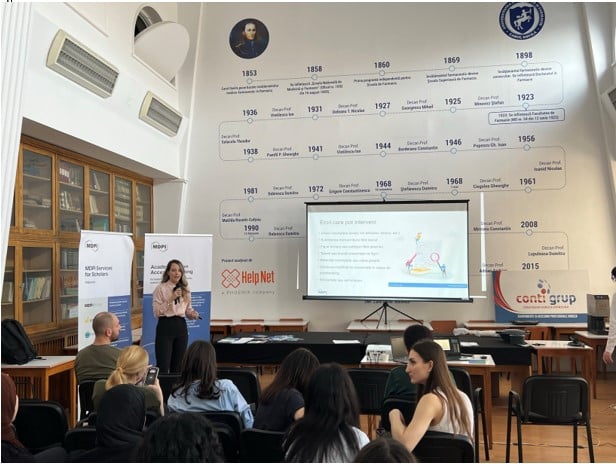
On 13 April 2024, the NextGEN 2.0 Student Conference took place at the Babes-Bolyai University of Cluj-Napoca. NextGen Healthcare organized this event with the university’s European Students’ Society to discuss European and international current affairs. MDPI Romania contributed an author training session called Steps of the Publication Process. Irina Codruta Zaharia, journal relations specialist, began the session with a general introduction of MDPI before diving into different article types, different layout formats, possible journals to submit to, the MDPI submission checklist, and the MDPI editorial process. By explaining the fundamentals of writing and publishing academic papers, Zaharia imparted valuable industry knowledge to the curious minds present. Participants were eager to engage with Zaharia in the subsequent Q&A session.
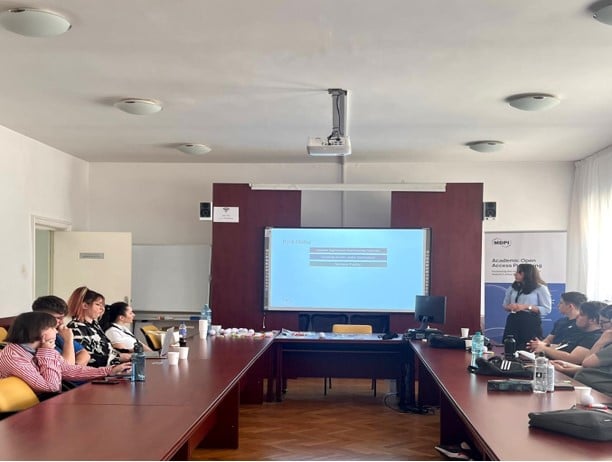
Celebrating its 20th anniversary this year, the International Conference “Students for Students” has long been a gathering place for undergraduate and postgraduate students of all nationalities to present their work and exchange ideas with each other. This year’s conference was held on 18 April 2024, with MDPI Romania contributing an author training session called The World of Open Access. Key speakers included Dr. Norbert Kiss from MDPI Romania and Prof. Dragos Horvath from Strasbourg University. Dr. Kiss discussed the history of open access, differences between open access publishing and traditional publishing, and implications for open access in the future. Attendees expressed keen interest in the subject, approaching Dr. Kiss with questions about academic publishing as well as his career trajectory.
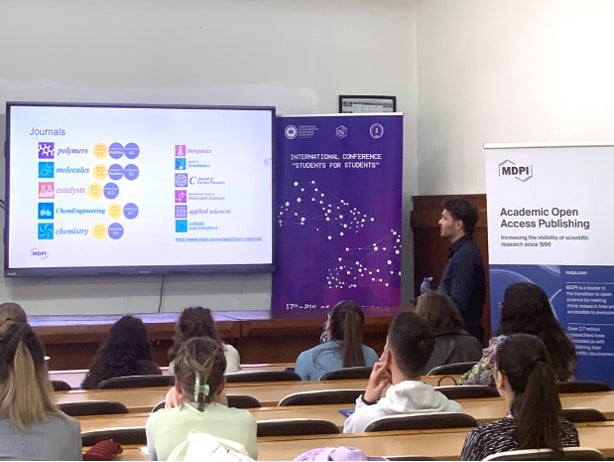
Most recently, on 26 April 2024, MDPI Romania sponsored the National Symposium of Students from Geology and Geophysics Faculties. The AAPG Students Chapter at the Babes-Bolyai University organized this event as an opportunity for geology students from all Romanian universities to present their work and confer with other researchers. Dr. Kiss gave his lecture The World of Open Access at this event as well.
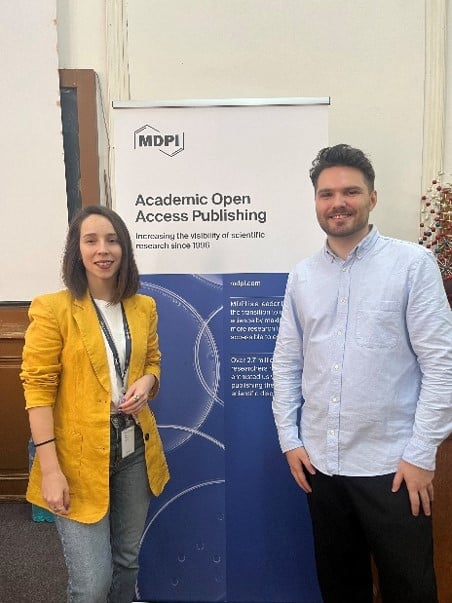
MDPI is thankful to all the participants, speakers, and organizers who attended these events. Through their enthusiasm and dedication, these events were great successes.
16 May 2024
Brain Sciences | Highly Cited Papers in 2022 and 2023 in the Section “Neurolinguistics”
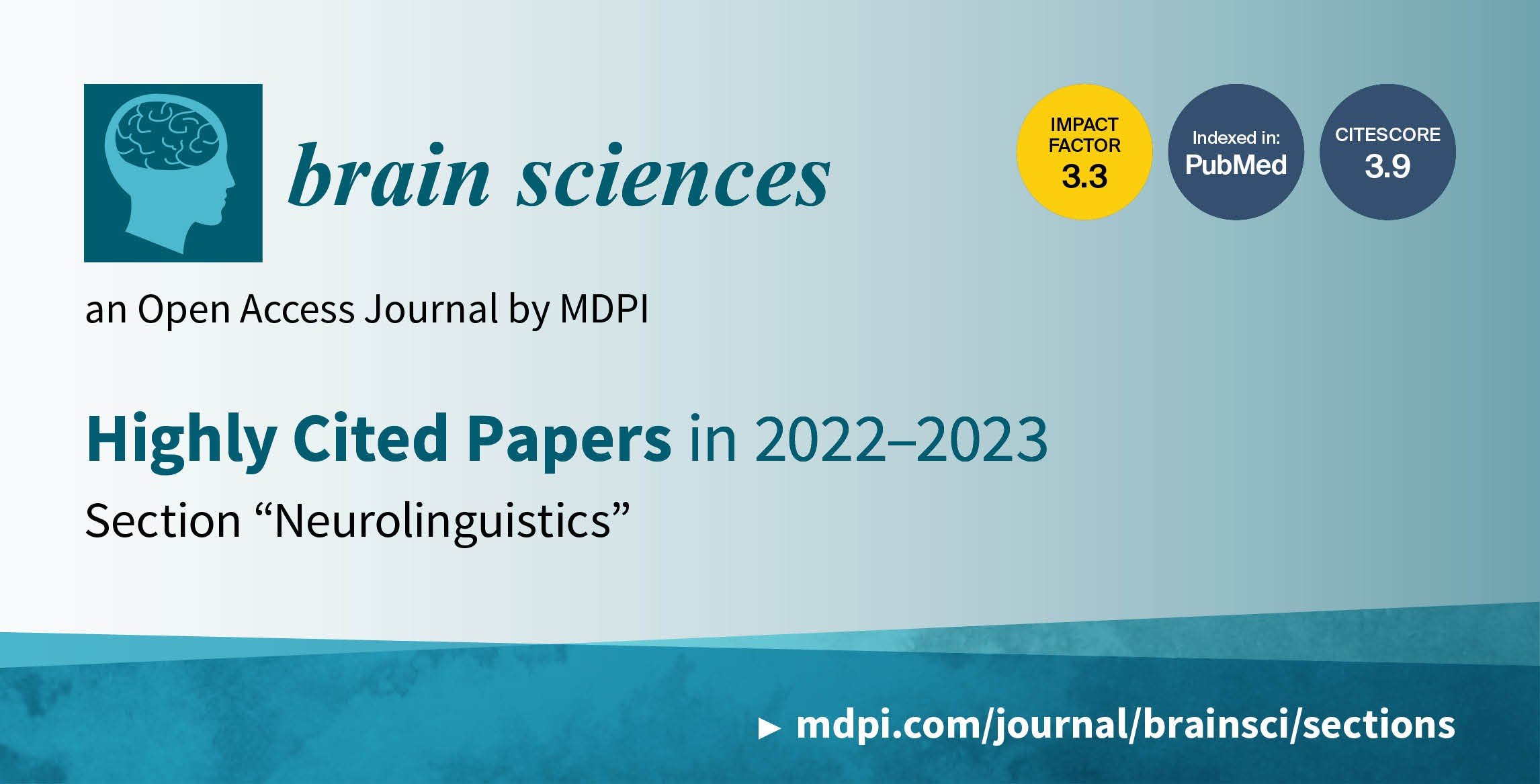
Neurolinguistics is the study of how the brain perceives, processes, and produces language. We welcome submissions presenting original research, metanalyses, and comprehensive reviews from researchers who are pursuing answers to questions such as: what about our brains makes human language possible? Why is our communication system so elaborate? In what ways is our communication system similar to and/or different from that of other animals? Does language use the same kind of neural computation as other cognitive systems (i.e., music or mathematics)? Where and how are words stored in our brain? How do we retrieve a word when we need it? Why is it sometimes difficult (or even impossible) to retrieve that word? How do people who speak more than one language switch between them, and what cognitive mechanisms prevent the languages from interfering with one another? In people who learn two (or more) languages from birth, how are their brains different from the brains of people who speak only one language? Are our left hemispheres really dedicated to language? If a person loses the ability to talk or read because of a stroke (or other forms of brain injury), will that person learn to talk again, and how well? What kinds of therapy are known to help the recovery of language following brain injury, and what new kinds of language therapy look promising in supporting this process? Do people who read languages written from left to right process it in the same way as people who read languages written from right to left? Do people who read a language that is written using non-alphabetic symbols instead of an alphabet process language differently? How do the brains of people with dyslexia compare to those of people who have no reading difficulties, and if there are differences, what are they? How does this work in people who have difficulty speaking, such as those who stutter?
In short, neurolinguistics is the study of neural underpinnings and mechanisms that support our ability to perceive, produce, and understand words and sentences, learn our first, second, and subsequent languages, and whose damage can result in disorders of speech, language, and reading.
As all of the articles published in our journal are of open access format, you have free and unlimited access to the full text. We invite you to read our most highly cited papers published in 2022–2023 listed below:
1. “It Takes a Village: Using Network Science to Identify the Effect of Individual Differences in Bilingual Experience for Theory of Mind”
by Ester Navarro, Vincent DeLuca and Eleonora Rossi
Brain Sci. 2022, 12(4), 487; https://doi.org/10.3390/brainsci12040487
Available online: https://www.mdpi.com/2076-3425/12/4/487
2. “Orofacial Muscle Strength across the Dysarthrias”
by Heather M. Clark, Joseph R. Duffy, Edythe A. Strand, Holly Hanley and Nancy Pearl Solomon
Brain Sci. 2022, 12(3), 365; https://doi.org/10.3390/brainsci12030365
Available online: https://www.mdpi.com/2076-3425/12/3/365
3. “Literacy Acquisition Trajectories in Bilingual Language Minority Children and Monolingual Peers with Similar or Different SES: A Three-Year Longitudinal Study”
by Paola Bonifacci, Ida Carmen Ferrara, Jessica Pedrinazzi, Francesco Terracina and Paola Palladino
Brain Sci. 2022, 12(5), 563; https://doi.org/10.3390/brainsci12050563
Available online: https://www.mdpi.com/2076-3425/12/5/563
4. “Examining Individual Differences in Singing, Musical and Tone Language Ability in Adolescents and Young Adults with Dyslexia”
by Markus Christiner, Bettina L. Serrallach, Jan Benner, Valdis Bernhofs, Peter Schneider, Julia Renner, Sabine Sommer-Lolei and Christine Groß
Brain Sci. 2022, 12(6), 744; https://doi.org/10.3390/brainsci12060744
Available online: https://www.mdpi.com/2076-3425/12/6/744
5. “Speech and Nonspeech Parameters in the Clinical Assessment of Dysarthria: A Dimensional Analysis”
by Wolfram Ziegler, Theresa Schölderle, Bettina Brendel, Verena Risch, Stefanie Felber, Katharina Ott, Georg Goldenberg, Mathias Vogel, Kai Bötzel, Lena Zettl et al.
Brain Sci. 2023, 13(1), 113; https://doi.org/10.3390/brainsci13010113
Available online: https://www.mdpi.com/2076-3425/13/1/113
6. “Theories about Developmental Dyslexia”
by John Stein
Brain Sci. 2023, 13(2), 208; https://doi.org/10.3390/brainsci13020208
Available online: https://www.mdpi.com/2076-3425/13/2/208
9 May 2024
Brain Sciences | Highly Cited Papers in 2022–2023 in the Section “Neurosurgery and Neuroanatomy”
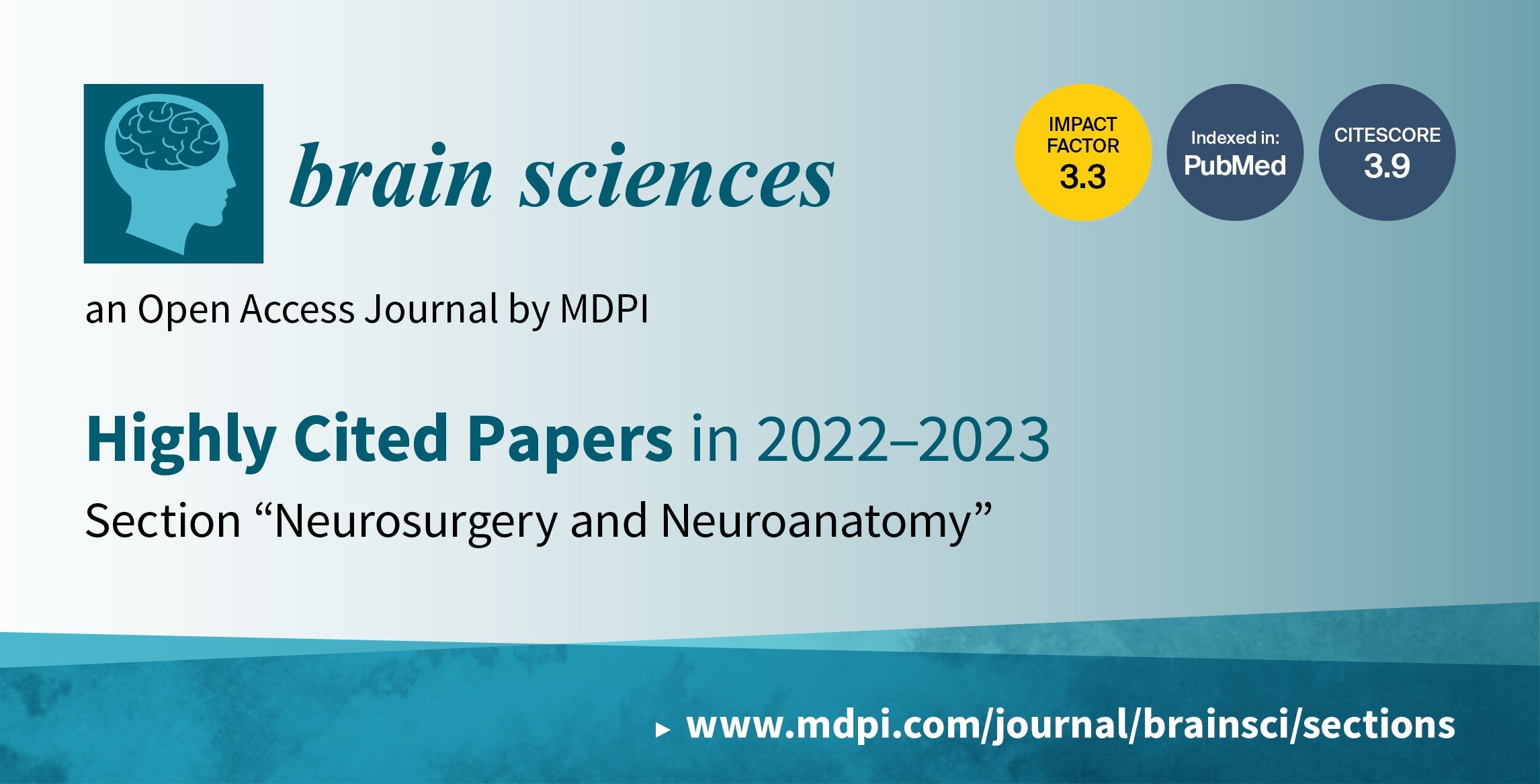
The aim of the “Neurosurgery and Neuroanatomy” Section of Brain Sciences (ISSN: 2076-3425) is to publish articles that integrate research, patient care, and education, and can connect neuroscientists, clinicians, and neuroanatomists to each other. The scope of this Section includes descriptive neurosurgical anatomy, human neuroscientific molecular anatomy, minimally invasive surgical techniques, neuroimaging studies, neuropathology, intraoperative visualization technologies, functional neurosurgical procedures, human clinical research studies, and literature reviews.
As all of the articles published in our journal are of an open access format, you have free and unlimited access to the full text. We welcome you to read our most highly cited papers published in 2022 and 2023, which are listed below.
1. “Maximal Safe Resection in Glioblastoma Surgery: A Systematic Review of Advanced Intraoperative Image-Guided Techniques”
by Lapo Bonosi, Salvatore Marrone, Umberto Emanuele Benigno, Felice Buscemi, Sofia Musso, Massimiliano Porzio, Manikon Poullay Silven, Fabio Torregrossa and Giovanni Grasso
Brain Sci. 2023, 13(2), 216; https://doi.org/10.3390/brainsci13020216
Available online: https://www.mdpi.com/2076-3425/13/2/216
2. “The Use of 3D Printed Models for Surgical Simulation of Cranioplasty in Craniosynostosis as Training and Education”
by Jean Francois Uhl, Albert Sufianov, Camillo Ruiz, Yuri Iakimov, Huerta Jose Mogorron, Manuel Encarnacion Ramirez, Guillermo Prat, Barbara Lorea, Matias Baldoncini, Evgeniy Goncharov et al.
Brain Sci. 2023, 13(6), 894; https://doi.org/10.3390/brainsci13060894
Available online: https://www.mdpi.com/2076-3425/13/6/894
3. “The Role of bypass Surgery for the Management of Complex Intracranial Aneurysms in the Anterior Circulation in the Flow-Diverter Era: A Single-Center Series”
by Francesco Acerbi, Elio Mazzapicchi, Jacopo Falco, Ignazio Gaspare Vetrano, Francesco Restelli, Giuseppe Faragò, Emanuele La Corte, Giulio Bonomo, Anna Bersano, Isabella Canavero et al.
Brain Sci. 2022, 12(10), 1339; https://doi.org/10.3390/brainsci12101339
Available online: https://www.mdpi.com/2076-3425/12/10/1339
4. “The Role of Isolated Nasal Surgery in Obstructive Sleep Apnea Therapy—A Systematic Review”
by Emily Schoustra, Peter van Maanen, Chantal den Haan, Madeline J. L. Ravesloot and Nico de Vries
Brain Sci. 2022, 12(11), 1446; https://doi.org/10.3390/brainsci12111446
Available online: https://www.mdpi.com/2076-3425/12/11/1446
5. “Factors Related to Hemifacial Spasm Recurrence in Patients Undergoing Microvascular Decompression—A Systematic Review and Meta-Analysis”
by Grazia Menna, Marco Battistelli, Alessandro Rapisarda, Alessandro Izzo, Manuela D’Ercole, Alessandro Olivi and Nicola Montano
Brain Sci. 2022, 12(5), 583; https://doi.org/10.3390/brainsci12050583
Available online: https://www.mdpi.com/2076-3425/12/5/583
6. “Are Sex Differences in Collegiate and High School Sports-Related Concussion Reflected in the Guidelines? A Scoping Review”
by Patryk A. Musko and Andreas K. Demetriades
Brain Sci. 2023, 13(9), 1310; https://doi.org/10.3390/brainsci13091310
Available online: https://www.mdpi.com/2076-3425/13/9/1310
6 May 2024
Brain Sciences | Highly Cited Papers in 2022–2023 in the Section “Developmental Neuroscience”
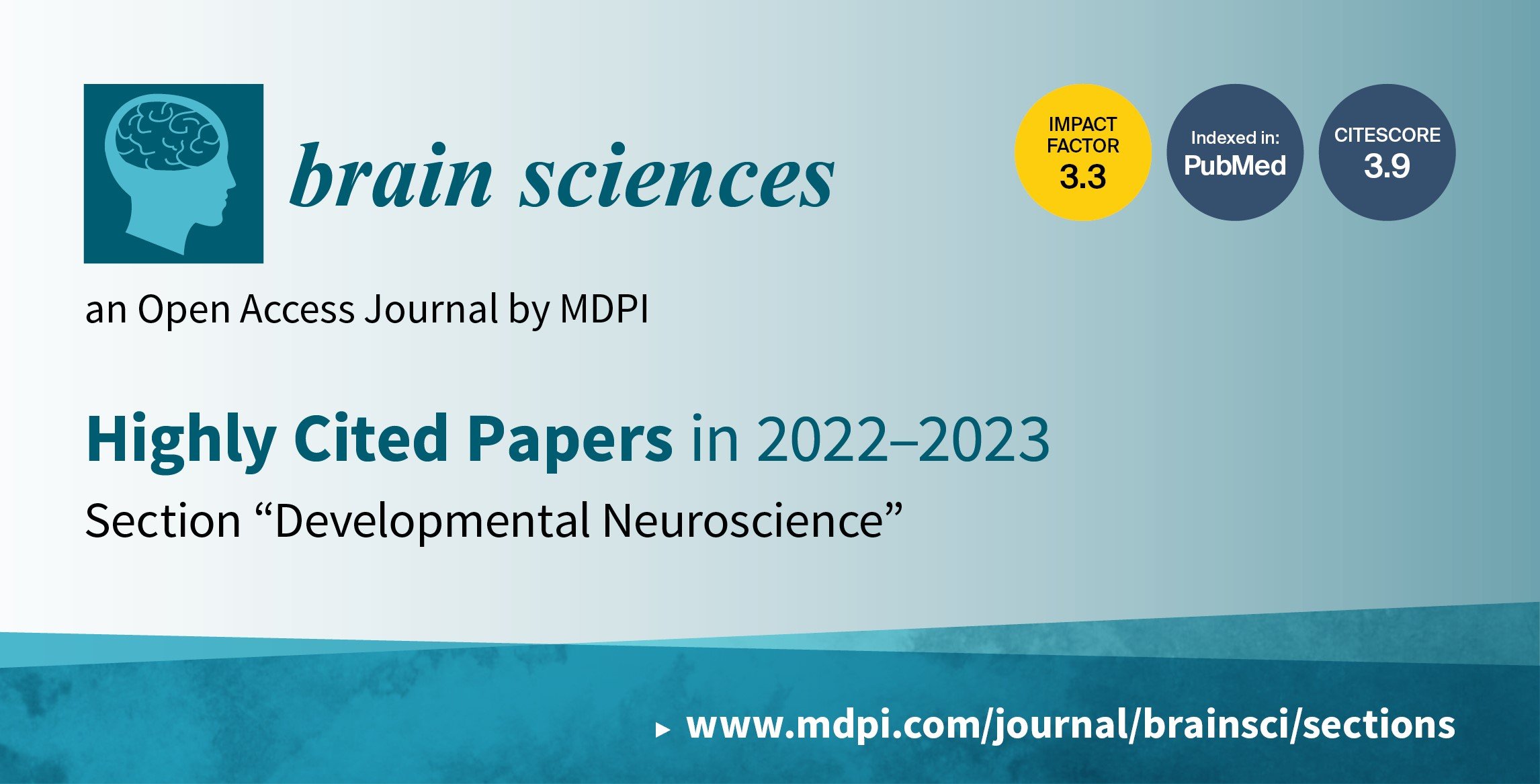
The aim of the “Developmental Neuroscience” Section of Brain Sciences (ISSN: 2076-3425) is to publish articles that identify the mechanisms of both normal neurodevelopmental processes and those that cause aberrant development leading to neurological disorders, from gestation through to adolescence, which set the foundation of adult configurations. The scope of this Section includes a broad multidisciplinary approach to understanding the clinical and basic aspects of neurodevelopment. As such, behavioral, cognitive, molecular, genetic, epigenetic, and imaging studies are particularly welcome.
As all of the articles published in our journal are of an open access format, you have free and unlimited access to the full text. We welcome you to read our most highly cited papers published in 2022 and 2023, which are listed below.
1. “Epidemiology of Cerebral Palsy among Children and Adolescents in Arabic-Speaking Countries: A Systematic Review and Meta-Analysis”
by Sami Mukhdari Mushta, Catherine King, Shona Goldsmith, Hayley Smithers-Sheedy, Al-Mamoon Badahdah, Harunor Rashid, Nadia Badawi, Gulam Khandaker and Sarah McIntyre
Brain Sci. 2022, 12(7), 859; https://doi.org/10.3390/brainsci12070859
Available online: https://www.mdpi.com/2076-3425/12/7/859
2. “Psychosocial Interventions for Attention Deficit/Hyperactivity Disorder: A Systematic Review and Meta-Analysis by the CADDRA Guidelines Work GROUP”
by Valerie Tourjman, Gill Louis-Nascan, Ghalib Ahmed, Anaïs DuBow, Hubert Côté, Nadia Daly, George Daoud, Stacey Espinet, Joan Flood, Emilie Gagnier-Marandola et al.
Brain Sci. 2022, 12(8), 1023; https://doi.org/10.3390/brainsci12081023
Available online: https://www.mdpi.com/2076-3425/12/8/1023
3. “Musical Performance in Adolescents with ADHD, ADD and Dyslexia—Behavioral and Neurophysiological Aspects”
by Christine Groß, Bettina L. Serrallach, Eva Möhler, Jachin E. Pousson, Peter Schneider, Markus Christiner and Valdis Bernhofs
Brain Sci. 2022, 12(2), 127; https://doi.org/10.3390/brainsci12020127
Available online: https://www.mdpi.com/2076-3425/12/2/127
4. “The Genetics of Intellectual Disability”
by Sandra Jansen, Lisenka E. L. M. Vissers and Bert B. A. de Vries
Brain Sci. 2023, 13(2), 231; https://doi.org/10.3390/brainsci13020231
Available online: https://www.mdpi.com/2076-3425/13/2/231
5. “Responding to Autism in Low and Middle Income Countries (Lmic): What to Do and What Not to Do”
by Roy McConkey
Brain Sci. 2022, 12(11), 1475; https://doi.org/10.3390/brainsci12111475
Available online: https://www.mdpi.com/2076-3425/12/11/1475
6. “Job Burnout and Job Satisfaction among Healthcare Service Providers in a Daycare Center for Individuals with Autism Spectrum Disorders in Low-Resource Settings”
by Sayyed Ali Samadi, Cemal A. Biçak, Nigar Osman, Barez Abdalla and Amir Abdullah
Brain Sci. 2023, 13(2), 251; https://doi.org/10.3390/brainsci13020251
Available online: https://www.mdpi.com/2076-3425/13/2/251
2 May 2024
MDPI Insights: The CEO's Letter #11 - 2023 Annual Report, MDPI Awards, STM

Welcome to the MDPI Insights: The CEO's Letter.
In these monthly letters, I will showcase two key aspects of our work at MDPI: our commitment to empowering researchers and our determination to facilitating open scientific exchange.
Opening Thoughts

2023 Annual Report
This is an exciting time of year at MDPI, as we have just released our annual report 2023, recapping the past year and sharing the progress and changes that took place during it.

Stefan Tochev (CEO, MDPI)
Reflecting on 2023, I can't help but think of the changes that have occurred not only at MDPI but also within our industry as a whole. In light of this, I’m reminded that change is the only constant, and that for a publishing enterprise that has experienced rapid growth, adapting to change becomes not only a necessity but also a catalyst for sustained success.
Looking back on the significant ground we covered in 2023, I am pleased to report that the year was marked by a rise in paper submissions, along with a range of initiatives aimed at improving our internal processes and delivering top services to our scientists.
2023 Top-line MDPI Numbers
An important priority for 2023 was to strengthen our editorial policies. Despite a notable increase in the number of papers submitted from 603,000 to 655,000 (+8.6%), there was a decrease in the number of papers published from 303,000 to 285,000 (-5.9%), consistent with the overall trend in the scholarly publishing market. MDPI’s market share in gold open access articles published reached 17% in 2023 (according to Dimensions data).
2023 Open Access Numbers
For over two decades, MDPI has been at the forefront of reshaping the academic publishing landscape, with OA surpassing subscription-based publishing in 2020. This trajectory is deeply rooted in our history and reflects our unwavering commitment to, and vision for, an open future. This momentum continued in 2023, with 39% of the 4.16 million articles and reviews published as gold full-OA, 15% as gold hybrid-OA, 8% as bronze-OA, and 3% as green-OA, relative to 35% behind a paywall. In terms of gold OA (full or hybrid) articles and reviews published, MDPI leads the way in terms of total articles published in 2023.
MDPI is the trusted and preferred OA publisher for the scholarly community
However, in 2023, we saw a downward trend in publication numbers compared to 2022. This trend was also seen in total OA publications. While the number of submissions increased, the decline in MDPI publications can be attributed to several factors, such as improved scrutiny in our peer-review process, including the evaluation of content scope and higher rejection rates, and a post-pandemic decrease in research related to COVID-19 papers.
Download 2023 MDPI Annual Report.
Access 2023 Digital Report.
Impactful Research

Recognizing Scholars – MDPI Awards
MDPI is committed to empowering young researchers as they embark on their careers. In 2023, our journals hosted a total of 400 awards, receiving 8,839 applications and nominations. The evaluation committees selected 959 winners, with the total budget for these awards amounting to CHF 546,500.
For more information about MDPI awards, applications, and winners, please click here
The following awards recognize scholars and the impact of their research, including Young Investigator Awards, Best PhD Thesis Awards, and Travel Awards for junior researchers.
MDPI Awards – The following awards require an application or a nomination.
Young Investigator Award (CHF 1000–2000 for each winner)
This award acknowledges the achievements of young investigators in research areas relevant to the journal’s scope. Candidates must have received their PhD no more than 10 years prior to the award announcement date and must be nominated.
Best PhD Thesis Award (CHF 500–800 for each winner)
This award recognizes young scholars who have completed outstanding PhD theses in research areas relevant to the journal’s scope. It aims to encourage them to continue their excellent work and make further contributions to their field.
Travel Award (CHF 500–800 for each winner)
This award encourages junior scientists to present their latest research at academic conferences relevant to the journal’s scope, thereby increasing their impact.
Distinguished Scholars
Additionally, 220 awards were granted to the most distinguished authors and reviewers in our journals through Best Paper Awards and Outstanding Reviewer Awards. The following awards are selected by the editorial staff of the journal and do not require an application or a nomination. They exemplify the excellent contributions made by our authors, reviewers, and editors.
These awards exemplify the excellent contributions made by our authors, reviewers, and editors
Best Paper Award (CHF 200–500 for each winner)
This award is granted annually to highlight publications of high quality, scientific significance, and extensive influence.
Outstanding Reviewer Award (CHF 500 for partial winners)
This award is given annually to recognize reviewers who generously contribute their time to reviewing papers and demonstrate thoroughness, professionalism, and timeliness in their reviews.
MDPI also offers awards for specific topics in various research fields:
Carbon Neutrality Award (CHF 500–800 for each winner)
Sponsored by MDPI journal Sustainability, this award recognizes applicants who have made exceptional academic or societal contributions to carbon neutrality, either in general or in relation to a specific carbon-neutrality-related issue.
Intelligent Manufacturing Award (CHF 500–800 for each winner)
Administered by MDPI journal Machines, this award is presented to an individual who has made outstanding academic or societal contributions to the field of intelligent manufacturing.
Granted: World Sustainability Awards
Inside MDPI

MDPI Opens Office in Seoul, Korea and Appoints Claude Seo as Office Manager
As CEO of the world’s leading OA publisher, I am pleased to announce the official opening of our Korean branch office. With this addition, MDPI now operates 21 offices in 12 countries worldwide, improving on our position as a truly global publisher. This expansion represents more than just an increase in our physical footprint; it is a pivotal step in our ongoing commitment to making scientific knowledge more accessible across the globe.
MDPI now operates 21 offices in 12 countries worldwide, improving on our position as a truly global publisher

Claude Seo (MDPI Korea Office Manager, Seoul)
Claude Seo, who has over 15 years of experience in the academic publishing industry, has been appointed as the Office Manager of the Seoul office. The launch of our Seoul office allows us to better support the Korean scientific community and to further promote the publication of OA journals in the region.
Reflecting on his role, Claude shared that he is:
“Delighted to have been entrusted with this position within MDPI, the no. 1 scholarly OA publisher. As we establish our presence in Korea, we are dedicated to integrating ourselves into the local community and contributing to its vibrant culture. Our commitment goes beyond business growth; it is about creating a more informed and innovative society by embracing and promoting diversity within the scientific community.”
Sungkyunkwan University Joins MDPI’s Institutional Open Access Program
Additionally, I am pleased to share that Sungkyunkwan University has joined MDPI’s Institutional Open Access Program (IOAP). This program offers free access to MDP’s online submission system for institutions and provides APC discounts to affiliated authors. Thirteen major Korean universities, including Sungkyunkwan University, Kyunghee University, Chung-Ang University, and the Catholic University of Korea, have adopted IOAP in Korea.
Learn more about MDPI’s collaboration in Korea in my previous CEO Letter, in which I recap our visit to Seoul, South Korea.
Coming Together for Science

4th MMCS: Harnessing the Power of New Drug Modalities
Our conference team successfully managed the 4th Molecules Medicinal Chemistry Symposium, held from 24–26 April in Barcelona, Spain. It was chaired by Prof. Dr. Diego Muñoz-Torrero from the Institute of Biomedicine (IBUB), University of Barcelona, Spain, and Prof. Dr. Simona Collina from the University of Pavia, Italy. In total, there were 84 accepted abstracts and 102 conference attendees from 22 different countries.
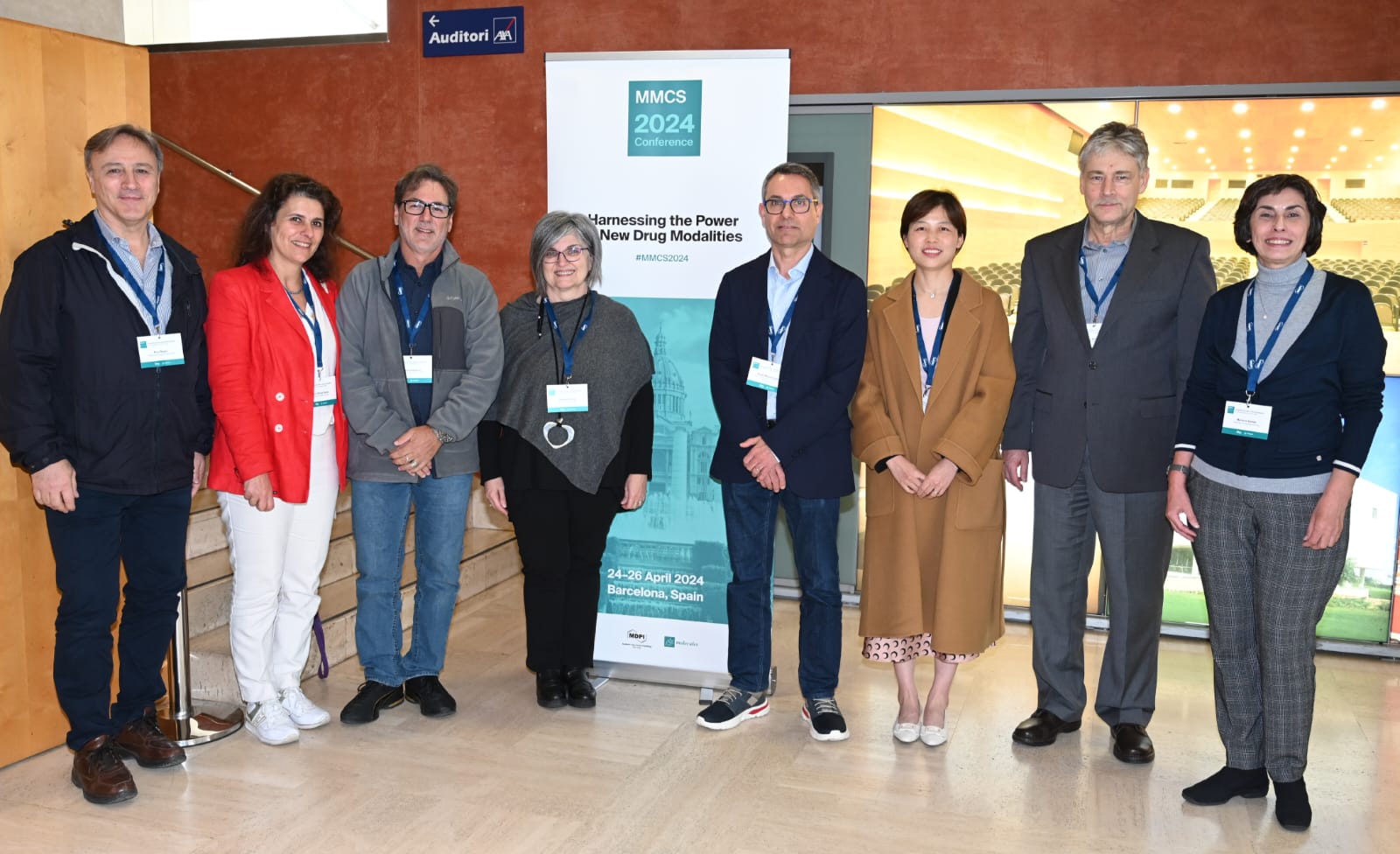
From left to right: Prof. Dr. Rino Ragno (Scientific Committee), Dr. Maria Emilia Sousa (Scientific Committee), Prof. Dr. Claudio Viegas Jr. (Scientific Committee), Prof. Dr. Simona Collina (Chair), Prof. Dr. Diego Muñoz-Torrero (Chair), Alvina Wu (Managing Editor, MDPI), Prof. Dr. Roman Dembinski (Scientific Committee), Prof. Dr. Mariana Spetea (Scientific Committee).
The event comprised 12 Invited Speakers, 35 Selected Talks, 10 Flash Poster Presentations, and 39 Posters. The overarching topic of the conference was the impact of the emergence of new drug modalities on drug discovery, with thematic sessions covering topics such as photoactivatable drugs, candidates targeting RNA and epigenetic targets, covalent modifiers, and the development of new anti-cancer agents, among other medicinal chemistry projects.
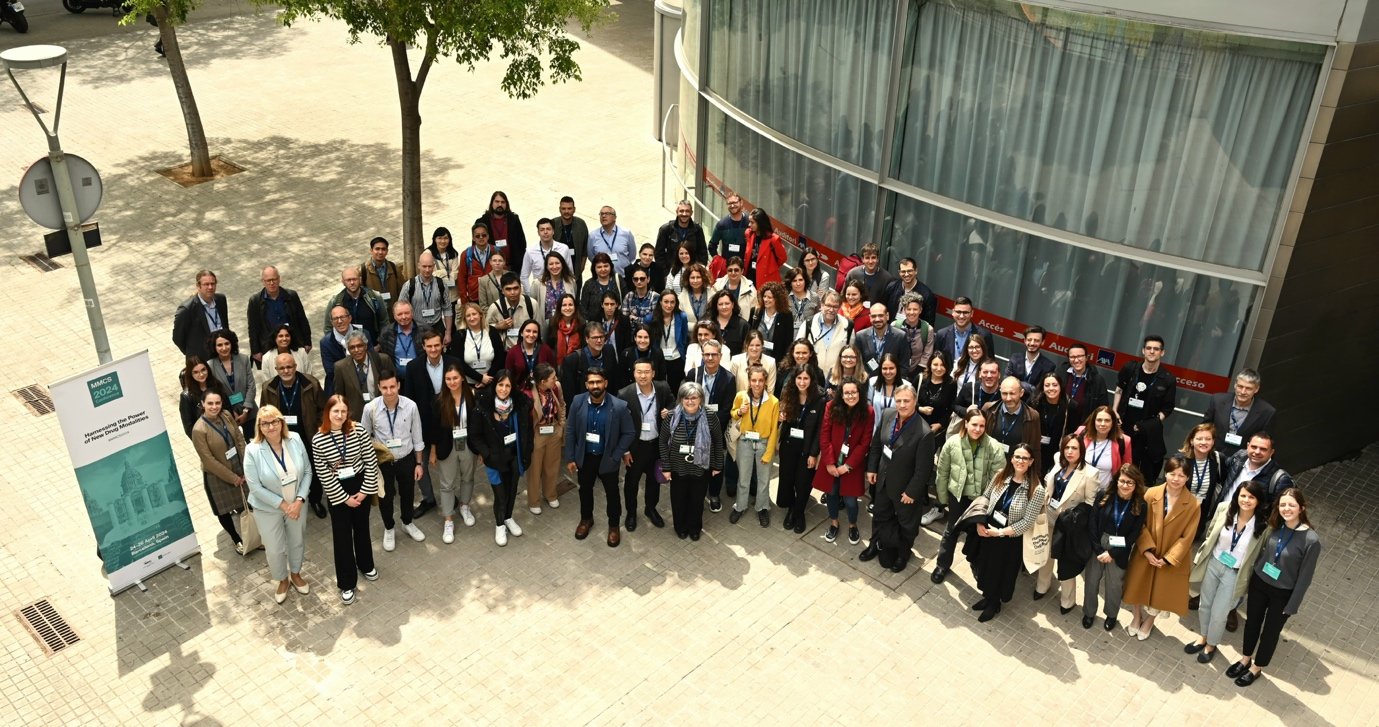
We are pleased to have received feedback from attendees highlighting the professional approach of the conference chairs and participants, the high quality of the talks, and the overall outstanding organization on the part of the MDPI conference team.
Thank you to the conference sponsors, Fluorochem and IBUB, and to our partnering societies, The Spanish Society for Biochemistry and Molecular Biology (SEBBM), and the Spanish Society of Medicinal Chemistry (SEQT).
Upcoming In-Person Event
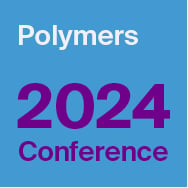
28–31 May, 2024
Polymers 2024 – Polymers for a Safe and Sustainable Future
Location: Athens, Greece
Conference Chairs: Prof. Dr. Dimitrios Bikiaris, Prof. Dr. Konstantinos Triantafyllidis, Dr. Ioanna Deligkiozi
We look forward to welcoming experts Prof. Damià Barceló, Prof. Minna Hakkareinen, and Prof. Armando J. D. Silvestre to this event.
Find more upcoming MDPI events here.
Organize Your Event with MDPI’s Sciforum
Sciforum is MDPI’s platform dedicated to the organization of scientific events. In line with our mission to promote science, Sciforum supports scholars, societies, research networks, and universities at all stages of organizing in-person events, virtual events and webinars. Our platforms are efficient, user-friendly, and cost-effective. We handle all steps related to event management. Contact us for details.
Closing Thoughts
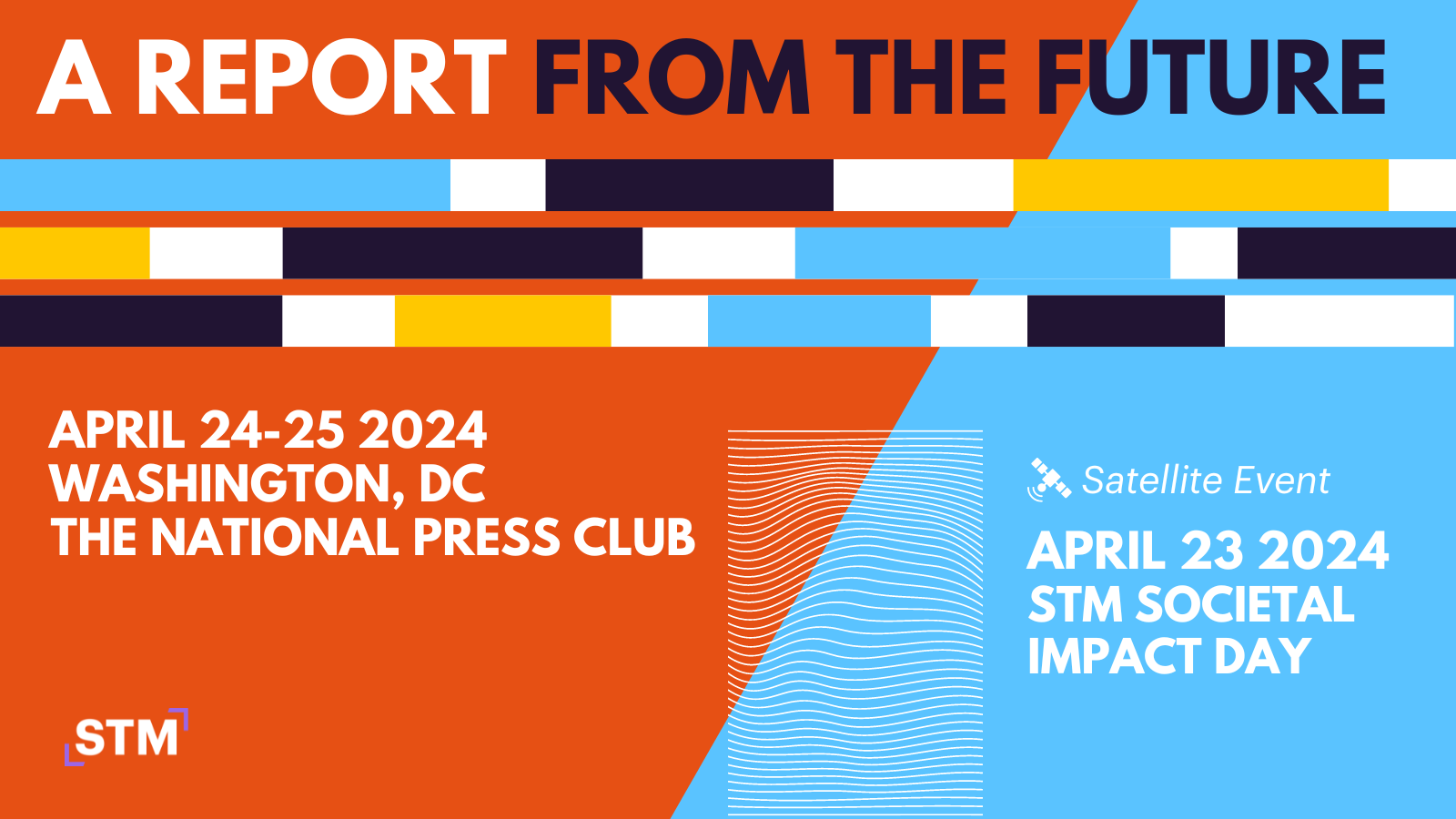
A Report from the Future – STM US Annual Conference 2024
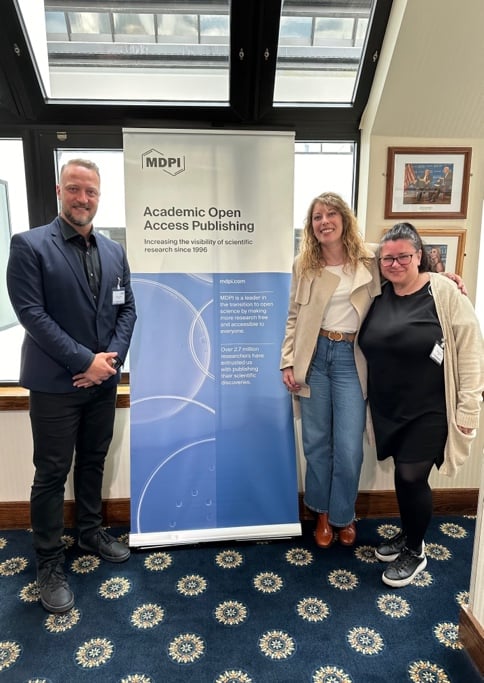
Stefan Tochev (CEO, MDPI), Dr. Giulia Stefenelli and Dr. Ioana Craciun from MDPI’s Scientific Office Board.
MDPI has for a long time been a sponsor of the STM Annual Conferences, held yearly in the US and Frankfurt, and is a trusted partner and supporter of the STM organization. While I have attended the Frankfurt conference for the past three years, this was my first time visiting the Washington, DC session, and I am glad I did.
Although it was a brief trip, I greatly appreciated the opportunity to attend in the company of my colleagues Dr. Giulia Stefenelli and Dr. Ioana Craciun from MDPI’s Scientific Office Board. They always help map some of the new industry trends against MDPI’s operational framework and guidelines. It’s a great group for kicking ideas back and forth on what we can apply at MDPI.
In my experience, STM never fails to deliver. It’s always a great conference for reconnecting with fellow publishers, industry friends, and vendors. As usual, STM this year curated a diverse range of speakers and panels, who proferred valuable knowledge and insights from outside our industry, delivering thought-provoking insights into our field. An example of this was the ‘Trust Panel’ session, which included Alan Schiffres (Managing Director, InfoLinx), who shared a number of the learnings about fraud and risk management from his 40 years in financial services, to help address some of the challenges we are currently facing in the area of publishing integrity.
Launch of STM Trends 2028 Panel
I particularly enjoyed the ‘Launch of STM Trends 2028 Panel’, which presented a report focused on the integration of humans and machines in scholarly publishing. The session highlighted themes such as AI, digitization, and the evolving research ecosystem. The report envisions a future where technology blurs the lines between human and machine involvement in research processes, with significant implications for trust, reputation, and equity. While this presents opportunities for connectivity and knowledge dissemination, it also poses challenges such as disinformation, fragmentation, and geopolitical tensions. We must rely on a wise combination of technology and human agency to navigate this complex landscape and will have to carefully examine its potential impacts on communication and scholarly publishing.
MDPI has joined the STM Integrity Hub. Click here to learn more.
While every presenter brought their own knowledge and personal touch, I was particularly pleased to encounter new speakers such as Heather Whitney (Research Assistant Professor, Radiology, University of Chicago) and Igor Grossmann (Professor of Psychology, University of Waterloo, Canada). Having studied Sociology at the University of Guelph, I have a soft spot for fellow social scientists from Canada, and I was very impressed by Igor’s presentation on ‘The Social Scientist: A View from the Future’ and his participation in the panel session ‘The Future Beyond the Article,’ which was one of my favourites from the conference, given the diversity of perspectives from the panel speakers.
Memorial Park in Washington, DC

On a personal note, this was my first-time visiting Washington, DC, and I’m glad we took an afternoon to visit the Memorial Park, with its incredible monuments to figures ranging from Martin Luther King, Jr. to Abraham Lincoln. The magnitude of the monuments is deeply impressive. I particularly appreciated the Thomas Jefferson memorial and the following quote, which I think speaks to the importance of change and adaptation. It’s something we can apply not only in our industry but also in our personal lives.
"I am not an advocate for frequent changes in laws and constitutions, but laws and institutions must go hand in hand with the progress of the human mind. As that becomes more developed, more enlightened, as new discoveries are made, new truths discovered and manners and opinions change, with the change of circumstances, institutions must advance also to keep pace with the times. We might as well require a man to wear still the coat which fitted him when a boy as a civilized society to remain ever under the regimen of their barbarous ancestors."
– Excerpted from a letter to Samuel Kercheval, July 12, 1816.
Chief Executive Officer
MDPI AG




